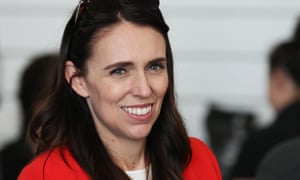Jacinda Ardern unveils borrowing plan as PM puts Labour on election footing
Jacinda Ardern unveils borrowing plan as PM puts Labour on election footing
Leader pitches schools overhaul in party conference message aimed at nation’s voters as much as Labour members
New Zealand Labour has used its party conference to announce it would borrow money for “significant” infrastructure spending – a move long urged by businesses and economists – as it made its pitch to New Zealanders ahead of a 2020 election.
The party put its most popular asset, prime minister Jacinda Ardern, front and centre at the weekend gathering, which also saw the election of a new, female president, as it moved to address claims it has mishandled internal sexual assault complaints.
Speaking to a rapturous crowd in the North Island city of Whanganui on Sunday, Ardern said the first tranche of the new funding would be spent on the country’s state-funded schools – a total of $400m – which she said would improve education and create jobs.
“In the world we live in, you’ll be hard-pressed to find a community where the school doesn’t sit in the centre,” she said. “No matter where you are in New Zealand, there will be a school, doing its best to give our children the very best start, supporting the local community, acting like a hub.”
The infrastructure funds – which were teased on Saturday by Grant Robertson, the finance minister, with most details still to be announced – were an outstretched hand to the centre-left government’s doubters in the corporate world, analysts said.
“That’s been the number one call from the business community, from economic commentators, from a lot of social services as well,” said said Ben Thomas – a former press secretary for the previous centre-right National government – of Labour’s decision to ease its borrowing rules for infrastructure. “That will allay a lot of the criticism of the business community, where business confidence has been an ongoing thorn in the side of the government for the last two years.”


David Cormack, a former head of policy and communications for the left-leaning Green party, said the decision to focus first on schools was clever and “tactically well done”.
“It’s something that goes all around the country, in every town, and something where you can see material change occurring when schools start seeing their infrastructure improved,” he said. “I’m sure it won’t hurt that a lot of schools will start seeing them completed just as the election rolls around.”
Ardern’s speech was full of her trademark calls to empathy, and attempted to delineate New Zealand’s politics from those of more fractured nations elsewhere.
“Politics at times no longer feels like a place for debate and dialogue, but a place for dissent and distrust,” Ardern said, of other countries. “We’re special because here we still debate. We still question. We still challenge our perspectives and views. But in amongst all of that, New Zealanders still expect something of politics, of government, of us.”
That Ardern was the conference’s star was inescapable; political reporters from Stuff noted that 13 photos of the prime minister featured in the conference booklet with no other lawmakers pictured on their own.
The prime minister was the party’s “strongest asset” and they were right to capitalise on that, analysts said. While Labour and the main opposition party, National, are close in the polls – with neither party capturing enough support to govern without the support of minor parties, according to recent figures – Ardern’s popularity far outstrips that of any other politician, Thomas said.
“There’s no question that the prime minister is not only Labour’s chief asset but possibly Labour’s only significant asset,” he said, noting Ardern’s “outstanding communication and personal skills”.
“But the government as a whole has failed to deliver on very significant promises, in particular housing, mental health, and tax reform,” he said, adding that its ambitious housing policies, in particular, had been “a disaster”.
The other matter anticipated ahead of the conference was the party’s response to claims about how it has dealt with internal misconduct allegations. The party’s former president Nigel Haworth resigned in September after claims he had mishandled sexual assault complaints against a party staffer.
On Saturday, a new president, Claire Szabo – who is the chief executive of volunteer organisation Habitat for Humanity New Zealand – was voted in. Cormack praised the party for dealing with the matter at the start of the event.
“You can’t really announce anything positive when you’ve got this big, negative, murky cloud hanging over you,” he said.
Two investigations into the sexual assault allegations are in progress. Szabo told reporters at the conference she would “work through” the reports when they were finished before deciding what should be done.
But Ardern’s main message to the party was her plan “simply to keep going”, she said as she outlined her list of Labour’s achievements to date. “Let’s keep doing this,” she said, was the party’s slogan heading into the next election.



Comments
Post a Comment